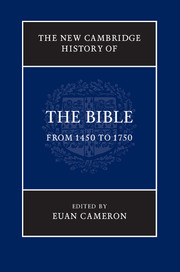Book contents
- Frontmatter
- Contents
- List of figures
- List of contributors
- Preface
- List of abbreviations
- Introduction
- PART I RETRIEVING AND EDITING THE TEXT IN EARLY MODERN EUROPE
- PART II PRODUCING AND DISSEMINATING THE BIBLE IN TRANSLATION
- PART III PROCESSING THE BIBLE: COMMENTARY, CATECHESIS, LITURGY
- 16 Authority
- 17 Theories of interpretation: The quadriga and its successors
- 18 The importance of the Bible for early Lutheran theology
- 19 The Bible in Reformed thought, 1520–1750
- 20 The Bible in Roman Catholic theology, 1450–1750
- 21 Orthodox biblical exegesis in the early modern world (1450–1750)
- 22 The Bible in the pulpit, 1500–1750
- 23 The Bible in catechesis, c. 1500– c. 1750
- 24 The Bible in liturgy and worship, c. 1500–1750
- PART IV THE BIBLE IN THE BROADER CULTURE
- PART V BEYOND EUROPE
- Afterword
- Select bibliography
- Select Bible bibliography
- Index
18 - The importance of the Bible for early Lutheran theology
from PART III - PROCESSING THE BIBLE: COMMENTARY, CATECHESIS, LITURGY
Published online by Cambridge University Press: 05 August 2016
- Frontmatter
- Contents
- List of figures
- List of contributors
- Preface
- List of abbreviations
- Introduction
- PART I RETRIEVING AND EDITING THE TEXT IN EARLY MODERN EUROPE
- PART II PRODUCING AND DISSEMINATING THE BIBLE IN TRANSLATION
- PART III PROCESSING THE BIBLE: COMMENTARY, CATECHESIS, LITURGY
- 16 Authority
- 17 Theories of interpretation: The quadriga and its successors
- 18 The importance of the Bible for early Lutheran theology
- 19 The Bible in Reformed thought, 1520–1750
- 20 The Bible in Roman Catholic theology, 1450–1750
- 21 Orthodox biblical exegesis in the early modern world (1450–1750)
- 22 The Bible in the pulpit, 1500–1750
- 23 The Bible in catechesis, c. 1500– c. 1750
- 24 The Bible in liturgy and worship, c. 1500–1750
- PART IV THE BIBLE IN THE BROADER CULTURE
- PART V BEYOND EUROPE
- Afterword
- Select bibliography
- Select Bible bibliography
- Index
Summary
The Lutheran Reformation had a profound impact on how the Bible is used in Christian discourse. In fact, that influence was so compelling that, for many, ‘Reformation’ and ‘Bible’ are inextricably linked. If there were a single image that best represents the Reformation, then it would probably be the Bible. At times, though, that association is so strong that it obliterates historical nuance and even leads to distorted assumptions about the Reformation as a whole. Statements such as ‘Luther rescued the Bible from papal tyranny’, ‘the Reformation gave the Bible back to the people’ or ‘the Catholic church banned Bible-reading’ are among the more popular of the (typically Protestant) generalisations which, at the very least, need heavy qualification. (Catholic polemicists circulate their own distortions of the Reformation, of course, but those are less pertinent to this particular issue.) In order to appreciate the Lutheran Reformation's impact on the role of the Bible in Christian theology, one therefore needs to step back from traditional confessional narratives and take a closer look at the historical evidence.
Prior to the Reformation, religious interest in the Bible was remarkably strong. The late medieval age saw an enormously rich devotional life, which in turn led to the formation of countless religious communities – both for laypeople and clergy. Many of these communities showed an interest in reading the Bible and came together in devotional Bible studies. Perhaps more important than the interest itself, however, is the fact that it was often met. Especially in the German-speaking lands, Bibles were not at all rare before Luther's translation appeared, and laypeople's access to the Bible was not prohibited as a general rule. Publication statistics show that, within the Holy Roman Empire between 1450 and 1519, printers produced sixty-five Latin editions of the Bible and no fewer than twenty-two editions in some form of vernacular German. According to some estimates there were more than 20,000 copies of vernacular Bibles in Germany prior to the Reformation. In Italy, too, there were numerous vernacular Bibles during the late 1400s. France, for reasons that go beyond the scope of this chapter, had far fewer vernacular Bibles before the Reformation, though Latin Bibles were as common there as elsewhere.
- Type
- Chapter
- Information
- The New Cambridge History of the Bible , pp. 439 - 461Publisher: Cambridge University PressPrint publication year: 2016



